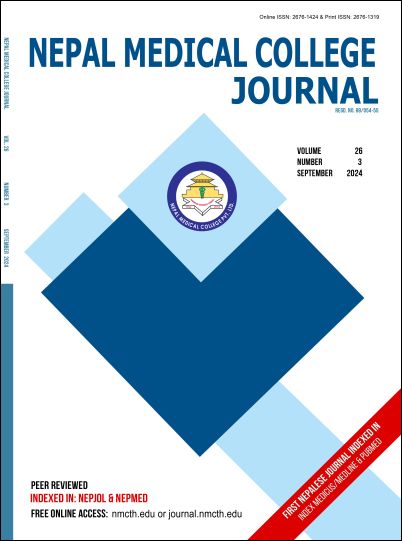Correlation of Diabetes self-care adherence with glycemic measures: a cross-sectional health facility-based study in Kathmandu, Nepal
DOI:
https://doi.org/10.3126/nmcj.v26i3.69874Keywords:
Glycemic control, self-care, Type 2 diabetesAbstract
Self-care plays a key role in prevention of complications, and improvement of the quality of life of persons with diabetes (PWDs). This study has assessed adherence to self-care behavior and its correlation with glycemic measures among PWDs attending private health care facilities in Kathmandu, Nepal. A cross-sectional study was carried out using a semi-structured questionnaire. Socio-demographic information and recent fasting (FBG) and 2-hr post-prandial blood glucose (2-hr PBG) levels were recorded. Self-care inventory (SCI) 12-item version was used to assess adherence to diabetes self-care over the preceding four weeks. Self-care practice was measured in five domains: glucose monitoring; diabetes medication; diet; exercise; and preventative care. The overall adherence score was obtained by computing the average of seven items (items 1, 2, 4, 5, 6, 7, 14). Scores more than or equal to median score were considered as higher levels of self-care efficacy. Univariate linear regression analysis of the subscale scores and individual item-wise score with age, duration of diabetes (years), FBG and PPBG levels was carried out. Pearson’s coefficient (r) was reported for normally distributed variables. Among 385 PWDs, mean FBG was 146 mg/dl (±54.7), 2-hr PBG was 210 mg/dl (±82). Median score for overall adherence to diabetes self-care was 25 (IQR:21 to 29). Higher self-care efficacy was seen among 55% (n=212). Overall adherence to self-care was significantly and negatively correlated with age and glycemic measures. Self-care efficacy was mainly driven by adherence to diabetes medication. Adherence to preventative care, exercise and home monitoring of blood glucose was low. FBG was significantly and negatively correlated with glucose regulation (r=-0.16, P=0.001), diabetes medication and food regulation (r=-0.11, P=0.03), preventative care (-0.14, P=0.03) and overall adherence to treatment (-0.15, P=0.004). 2-hr PBG was significantly and negatively associated with all domains of self-care (r -0.14, P=0.04 to -0.21, P<0.0001). Elderly persons, may face difficulty with regular physical exercise, dietary recommendations and overall adherence to self-care. Continuing diabetes education is imperative to motivate PWDs and caregivers regarding importance of self-care efficacy in glycemic regulation and diabetes care.
Downloads
Downloads
Published
How to Cite
Issue
Section
License
Copyright (c) 2024 Nepal Medical College Journal

This work is licensed under a Creative Commons Attribution 4.0 International License.
This license enables reusers to distribute, remix, adapt, and build upon the material in any medium or format, so long as attribution is given to the creator. The license allows for commercial use.




